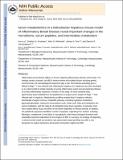Serum Metabolomics in a Helicobacter hepaticus Mouse Model of Inflammatory Bowel Disease Reveal Important Changes in the Microbiome, Serum Peptides, and Intermediary Metabolism
Author(s)
Lu, Kun; Knutson, Charles G. F.; Wishnok, John S.; Fox, James G.; Tannenbaum, Steven Robert
DownloadFox_Serum metabolomics.pdf (1.058Mb)
OPEN_ACCESS_POLICY
Open Access Policy
Creative Commons Attribution-Noncommercial-Share Alike
Terms of use
Metadata
Show full item recordAbstract
Inflammatory bowel disease (IBD) is a chronic relapsing inflammatory disorder of the bowel. The etiology remains unknown, but IBD is immune-driven and multiple factors including genetic, environmental, and microbiological components play a role. Recombinase-activating gene-2-deficient (Rag2–/–) mice infected with Helicobacter hepaticus (H. hepaticus) have been developed as an animal model to imitate naturally occurring inflammatory events and associated key features of chronic inflammatory responses in humans. In this study, we have combined mass spectrometry-based metabolomics and peptidomics to analyze serum samples of Rag2–/– mice infected with H. hepaticus. Metabolomics profiling revealed that H. hepaticus infection dramatically changed numerous metabolite pathways, including tryptophan metabolism, glycerophospholipids, methionine-homocysteine cycle, citrate cycle, fatty acid metabolism and purine metabolism, with the majority of metabolites being down-regulated. In particular, there were notable effects of gut microflora on the blood metabolites in infected animals. In addition, the peptidomics approach identified a number of peptides, originating from proteins, including fibrinogen, complement C4, and alpha-2-macroglobulin, with diverse biological functions with potentially important implications for the progress of IBD. In summary, the strategy of integrating a relevant animal model and sensitive mass spectrometry-based profiling may offer a new perspective to explore biomarkers and provide mechanistic insights into IBD.
Date issued
2012-10Department
Massachusetts Institute of Technology. Department of Biological Engineering; Massachusetts Institute of Technology. Division of Comparative MedicineJournal
Journal of Proteome Research
Publisher
American Chemical Society (ACS)
Citation
Lu, Kun, Charles G. Knutson, John S. Wishnok, James G. Fox, and Steven R. Tannenbaum. “ Serum Metabolomics in a Helicobacter Hepaticus Mouse Model of Inflammatory Bowel Disease Reveal Important Changes in the Microbiome, Serum Peptides, and Intermediary Metabolism .” Journal of Proteome Research 11, no. 10 (October 5, 2012): 4916–4926.
Version: Author's final manuscript
ISSN
1535-3893
1535-3907